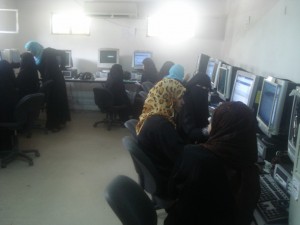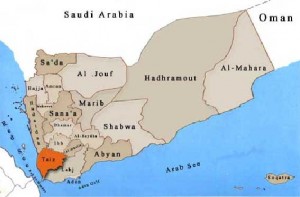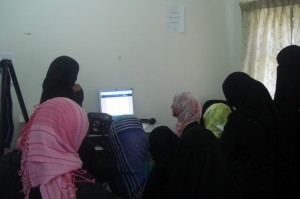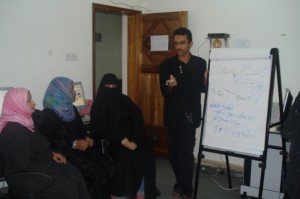Rising Voices note: The following is a republication of a post written by Ghaida'a al-Absi about the completion of the Rising Voices grantee project in Yemen and their goal to teach 200 Yemeni women to blog despite the challenges.
The first post in the Empowerment of Women Activists in Media Techniques – Yemen (EWAMT) blog was about the “Ignorance of Blogging in Yemen,” which was true in 2009 at the beginning of implementing the EWAMT project. However, blogging has now become more popular in Yemen. We won't say that it is because of our initiative, but also because of many other youths who have spread these techniques. Some of these youth were trainees in one of our EWAMT sessions. Now I can say that someone who may not have a blog at least he/she knows what does the word means. Here, I will talk about our journey with EWAMT whose mission was to spread the notion of blogging to 200 young Yemeni women. Here, we are finalizing our project with the pride of what we have done as team, and with appreciation to Rising Voices for giving us the opportunity.
We still remember our first training on May 20, 2009, and how hard it was to organize the posters, brochures, coffee breaks, folders with notes, and the search for an inexpensive computer lab, etc. The first step is always the hardest to make, but once we started, we felt enthusiastic to finish our mission. Then we received many letters from local NGOs nominating their female employees to the blogging workshops.
EWAMT also conducted a workshop in the city of Ta'izz, in partnership with the National Culture Center for Youth. Ta'izz is located 225-km away from the capital, Sana'a. It is very well-known in Yemen as the Dreamer city, and it is where the Yemeni revolution started, so it is also known now as the revolutionary city.
I participated in training organized by NDI in July 2011 about “Good Citizen Journalistic Practices“. In this training, we came out with the most important ethics that any citizen media activist or blogger should have. I have transmitted this knowledge to my trainees later.
Another fact of life is that no success is without obstacles or challenges. We went through many critical challenges that made us very frustrated. One of the most overwhelming obstacles was the electricity cutting, and the slow speed in Internet connectivity. In addition, we could not rent another lab with a generator because it was too expensive for us. So we stuck with the lab we had rented before at the beginning of the project from All Girls Society for Development, but because of the electricity problem we had to delay part of our workshop so many times. The second challenge was for me as the implementer of the project. We were implementing EWAMT project under the umbrella of Hand in Hand initiative. This initiative broke apart, and I founded another team and initiative called Kefiaia, which means “enough’ in Arabic.
The EWAMT workshops were not only about technical issues of blogging, but also were about exploring, discussing, and raising awareness about issues had being rarely talked about in the public sphere because of the conservativeness of the Yemeni society, and sometimes because of the fear from the Yemeni intelligence would arrest anyone who expresses his/her discontent about the Yemeni regime.
The Yemeni revolution started on February 2011, and it was not a surprise for us. Most of the people were enraged about the Yemeni government, and when Tunisia started the revolution series, it encouraged the Yemenis to break their silence and demonstrate peacefully. Most of the Yemenis are very well armed (Yemen's Weapons Culture), but they left their weapons at home and went to demonstrate; to prove to the whole world their pacifism. The revolution has two sides effects. The positive side is that it heightened awareness among people, both politically and socially. Moreover, it also gave us hope that one day we will see a new, developed Yemen. At the level of EWAMT project, many of women blogged about the revolution from their perspective. The negative side that a lot of people lost their jobs because many foreign organizations and companies left Yemen due to the continuous threats of the Yemeni regime to drag the country into civil war. Furthermore, as a kind of punishment, the Yemeni government had cut the electricity for 23 hours a day, so we had only one hour to charge our electronic devices in order to do the essential work. In this situation, it was almost impossible to finish training the last 20 women.
The revolution lasted for more than 10 months and it is still going on. During all that time, we severely suffered from a shortage of electricity, water, and fuel. We stopped the EWAMT workshops for many months, and then we reached a solution as to how to finish our work under these hardships. We bought two additional batteries for laptops and two internet USB modems. Once a week, I trained two women in my house by using the laptops and the internet USBs or sometimes we went to cafes that had generators and internet connectivity. Each week or sometimes every two weeks, we trained from two to three women. In this way we finished our ultimate goal to train 200 Yemeni women in blogging.







